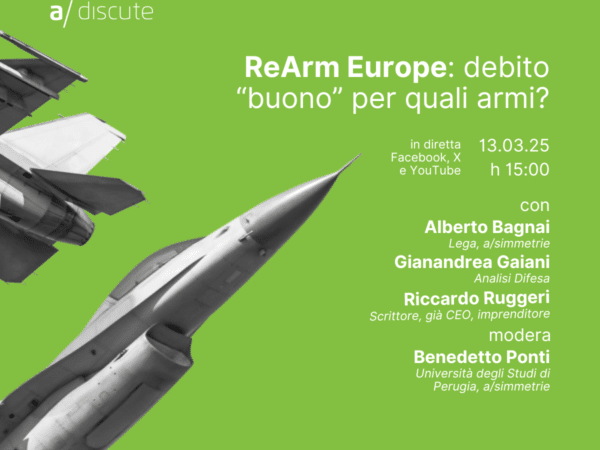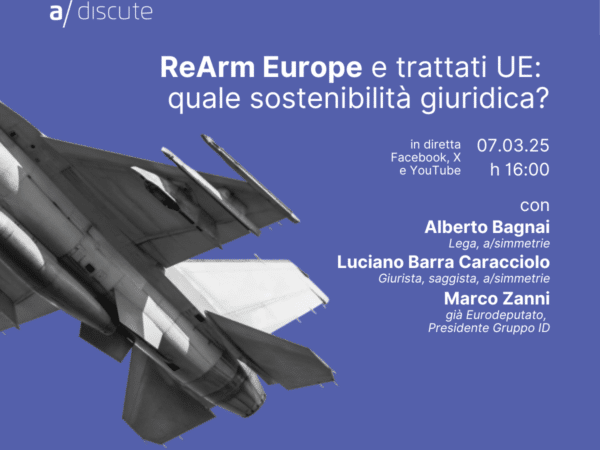It is no secret that the next desired step in European integration is to achieve a truly common security and defence policy, a “Security and Defence Union” with own financial and military powers. Political leaders across the continent have clearly flagged it as a top priority for the next years. Many acceptable reasons are often invoked to argue in favour of such a move. However there are important arguments suggesting that what is commonly considered a positive evolution would instead represent the deathblow to the relatively long period of peace and integration in Europe. A common defence with a common army, but without a true nation, could well lead to the next European civil war.
Already in June 2015 the European Political Strategy Centre (the in-house group of policy advisers to President Juncker) issued a note, which explicitly mentioned external and internal “threat of war in Europe” as an impulse to move in that direction. The note suggested also that the deteriorating economic situation should push EU countries towards military integration.
“Military, economic and strategic considerations all add up to one inevitable conclusion: if we need to do more with less money, gradually increased defence integration is our best – and only – option. (…) A European army as a long-term project of willing Member States has kindled a necessary debate. The real question now is where and how to start.” In other words, there is no alternative.
“More Europe in defence and security is clearly needed. (…) Time has come to establish Operational Headquarters (OHQ) in Brussels to ensure effective planning, command and control of operations, in particular when a joint civil/military response is required.” Finally, a “European Semester process on defence capabilities” should be launched as soon as possible.
The Clingendael Institute, a Ducth think-tank providing advice on international affairs to the government, the parliament, the armed forces and the private sector, entered the debate with a couple of reports on the same matter. With perfect timing, right at the beginning of the Dutch Presidency of the EU in January 2016, it suggested to “take defence out of its ‘exceptional’ and stove-piped status”, to “address rapidly the institutional, legal and financial barriers which block the integrated approach”, and “to bring defence home to the domestic audiences and help re-appreciate the role of defence in keeping them safe”. The common security and defence policy should have “civilian and military instruments at its core” and “the EU has to move beyond soft power. Without hard power the EU will never be able to act as a credible security provider”.
Finally, in February 2016 the European Union Institute for Security Studies wrote that “to ensure its security, Europe needs strong and modern military capabilities. (…) Europe’s ongoing economic and fiscal crisis has clearly had a negative impact on the resources available to EU member states to engage in security-related activities. (…) In the not too distant future, no single European country will have the resources necessary to develop a full range of capabilities on its own – so now is the time to start pooling resources”.
In a period of heated discussion about the future of the EU, with increasing centrifugal pressures in several countries (from Grexit to Brexit, to raising Euro-scepticism in most member states) such an unprecedented push towards extreme forms of further integration looks at least weird. Such acceleration against the common feeling expressed by the population across Europe should ring a bell.
The reasoning repeated in all these documents, and in many second- and third-hand propaganda by local media, is clear: geopolitical instability poses increasing external and internal threats to the security of citizens, who have finally become more sensitive to these issues, moreover the prolonged pressure on public finances means that countries have less resources at disposal for military investments, therefore pooling scarce resources in a common security and defence policy equipped with hard military powers is the only possible solutions. There is no alternative.
The pillars of such a common security and defence union should be a common army, common border control, and a single foreign policy, the dream of every federalist. Difficult to disagree with such a dream, at first sight. However a more careful analysis suggests that this may be yet another ambitious project grounded on weak foundations, which eventually brings to disintegration, rather than to federation.
With such architecture in place, who should coordinate these military capabilities? Can a country delegate the military control of its border to a supranational unaccountable body? Would it still be sovereign? When it comes to deciding how to enforce the control in a specific circumstance, who will take this decision? If the enforcement implies negative externalities for a country or group of countries, how will this be handled? When conflicting national interests are at play, who will decide which one prevails? An unaccountable supranational bureaucracy? Or the strongest government(s)? Will this be acceptable for the others? When foreign policy interests are not aligned, which country will eventually win? And how long will a critical foreign policy decision take? And how will the “loser” country react? How would prolonged frustration on defence and military issues in one country be managed?
This chaos should sound familiar, as decades of incomplete ambitious projects have shown. None of them has brought the EU closer to political union. Launching a monetary union against any economic rationality, and most of all without prior political union, has led to economic instability. Schengen without prior political union is also leading to social instability, as recent events prove. A flawed “security and defence union” will inevitably lead to military instability. But compared with the previous projects, this is a much riskier gamble: military instability eventually means war.
Agenor





